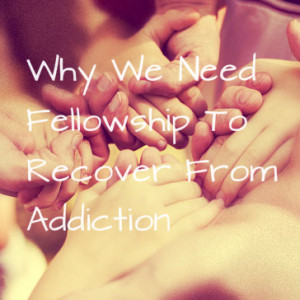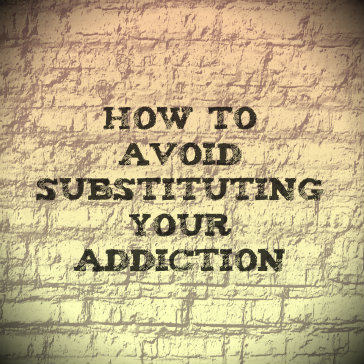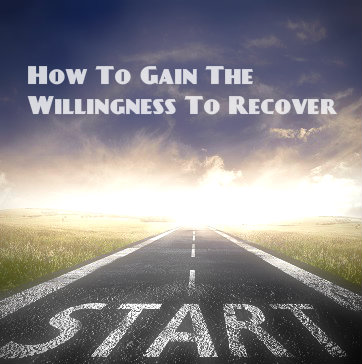Almost without exception, alcoholics are tortured by loneliness. Even before our drinking got bad and people cut us off, nearly all of us suffered the feeling that we didn’t quite belong. Either we were shy, and dared not draw near others. Or we were noisy good fellows constantly craving attention and companionship, but rarely getting it. There was always this mysterious barrier we could neither surmount nor understand.” (A.A. Twelve Steps and Twelve Traditions, 57)
The Isolation Of The Addict
 Isolation and addiction go hand in hand. Even if we were out every night and closing down the bars, surrounded by hordes of people, we felt somehow lonely. It wasn’t the presence of people we lacked, but relationship. In addiction we were confused about who we were and afraid to know our true selves. We used our addictions to hide from ourselves and to try to be the people we thought we wanted to be. Yet we suspected we didn’t belong and were quite certain that if people knew who we really were, they’d reject us. The loneliness was profound.
Isolation and addiction go hand in hand. Even if we were out every night and closing down the bars, surrounded by hordes of people, we felt somehow lonely. It wasn’t the presence of people we lacked, but relationship. In addiction we were confused about who we were and afraid to know our true selves. We used our addictions to hide from ourselves and to try to be the people we thought we wanted to be. Yet we suspected we didn’t belong and were quite certain that if people knew who we really were, they’d reject us. The loneliness was profound.
Fellowship: The Antidote To Isolation
The 12-Step Program is designed to begin bringing us out of isolation. That doesn’t mean simply throwing us in a room with a bunch of other drunks and junkies, it means helping us to know ourselves in ways we never had. As we work the Steps we learn to see ourselves honestly and we begin cultivating a real relationship with that self. We grow in humility and we lose our fear of rejection. Through the working of the Steps we are cleaning up the wreckage of the past and seeking to live well in the present by practicing the program principles in all of our affairs.
Meeting Fellowship Encourages Sobriety
Our isolation perpetuated our addiction. To recover, we do our part to begin breaking the secrecy that allowed our addiction to control our lives. The meeting is the place where we start this process. Knowing we are among those who have walked similar paths, we begin to feel comfortable opening up and being real. The meeting is a safe place where we won’t be judged or ostracized. There we find a system of support—people who are personally invested in our sobriety and wellbeing.
Cultivating Fellowship For Recovery
We can, of course, go through the motions without ever going deeper than surface level with our program fellows. But this only jeopardizes sobriety. We all need time to acclimate to the 12-Step life and we may not be ready to have complete strangers prying into our business, but we have to be moving in the direction of relationship. How?
By being intentional. The program recommends picking up the phone and talking with other members—ideally three a day. These don’t have to be profound conversations, but one day they will be. It’s an exercise in breaking down isolation and overcoming the fear of people. We don’t show up to the meeting late or duck out early. We force ourselves to interact. We take a sponsor and set up a schedule of regular interaction. We meet with other fellows in coffee shops to talk about the program. We serve. And we remember that coming out of isolation is one of the best secrets to lasting sobriety.
Life takes on new meaning in A.A. To watch people recover, to see them help others, to watch loneliness vanish, to see a fellowship grow up about you, to have a host of friends—this is an experience you must not miss.” (Alcoholics Anonymous, 89)
Read More About Starting Over And Embracing Life In Recovery
28 Jan 2014
Will I Always Be In Recovery?
Recovery is an important word for addicts. The word implies a process. When you are in recovery, you are working toward a goal. That goal is to never use again, to remain sober, to avoid relapsing. A process also implies that there is an end point, that at some time you will be fully recovered. Is that really possible or is recovery a lifelong state of being?
Is Addiction Really A Disease?
 Thanks to years of research, we are finally beginning to better understand drugs, how they affect the user, how they change the brain, and what addiction really is. It turns out that addiction is a disease of the brain, and a chronic one. Like any other chronic disease (asthma, diabetes, heart disease, arthritis), addiction will keep returning if left untreated.
Thanks to years of research, we are finally beginning to better understand drugs, how they affect the user, how they change the brain, and what addiction really is. It turns out that addiction is a disease of the brain, and a chronic one. Like any other chronic disease (asthma, diabetes, heart disease, arthritis), addiction will keep returning if left untreated.
Some people still cling to the idea of addiction as a matter of willpower only, but the truth is that drugs change your brain. This means that giving up drugs becomes a difficult process requiring professional treatment. While people being treated for diseases like arthritis and high blood pressure are in recovery, so too are addicts going through the treatment process. If someone with high blood pressure stops taking his pills, his symptoms will return. If a drug addict stops seeking treatment, odds are he will start using again.
Is It Possible To Be Recovered From Addiction?
Research shows that drugs change your brain, both chemically and physically. The more you use and the longer the duration of use, the more changes will occur. Research also shows that these changes can improve with abstinence from drugs, but that they may never fully reverse. Addiction forever changes you, which means that being completely recovered may never be possible.
It may sound hopeless, but take strength in knowing that the longer you stay sober, the easier it becomes to resist the urge to relapse. Although your brain may not completely recover from drug use, it comes very close. Studies show, for instance, that when a meth user abstains for just 14 months, her brain returns to a near normal state. From that point on, avoiding relapse becomes monumentally easier.
How You Can Help Yourself And Others In Ongoing Recovery
It may seem like being recovered is a goal for which all addicts should strive. If you are recovered, all your problems are over, right? For the addict, the word recovered is a dangerous one. If you believe you are recovered, you might believe that you are not vulnerable to relapse. A recovering addict always carries that possibility. Even an addict who has been sober for decades could relapse and hit rock bottom again.
Being forever in recovery may seem daunting, but it protects you from becoming too relaxed about your addiction. It also gives you a reason to be continually improving yourself and your life. Always striving toward being a better and healthier person is a great way to live. Most people become stagnant in their lives. You, however, have the opportunity to be always bettering yourself.
Use your recovery as a tool and a process for becoming a better person. As you resist the urge to relapse, improve your life in other ways as well. Use activities like volunteer work, your career or spending time with loved ones as ways to be a good person, and to be successful in recovery. Turn to exercise, healthy eating or spirituality to make your life better and to stay clean. You may never fully recover, but you will always be in the process of living your life to its greatest potential.
Read More About Starting Your Life Over In Recovery
27 Jan 2014
How to Avoid Substituting Your Addiction
A substitute addiction is a substance, activity or behavior that replaces a previous addiction. Acquiring a substitute addiction is not uncommon for those in recovery from drug or alcohol dependence. Being an addict takes up the biggest portion of your life.
When you are addicted to drugs or alcohol, you obsess over getting more, you earn money just so you can buy more, you try to hide your habit, and you fight with loved ones about it. In other words, addiction takes over your life. When it is gone, it may feel like you have a void in your life that needs filling. It is possible to fill that hole with positive activities and healthy relationships, but if you’re not careful, you may just slip into another addiction.
Are Substitute Addictions Always Bad?
 For some addicts in recovery, a substitute addiction may start out as a healthy new activity. Maybe you have taken up an exercise regimen, or you have started going to church again. Perhaps you are ready to devote yourself to your job and to getting a promotion. None of these are bad ideas, but they can become unhealthy obsessions and even approach the level of a behavioral addiction if you do not monitor your behaviors.
For some addicts in recovery, a substitute addiction may start out as a healthy new activity. Maybe you have taken up an exercise regimen, or you have started going to church again. Perhaps you are ready to devote yourself to your job and to getting a promotion. None of these are bad ideas, but they can become unhealthy obsessions and even approach the level of a behavioral addiction if you do not monitor your behaviors.
Not all addicts will develop these substitute addictions, but it is possible. There are underlying reasons you became an addict in the first place. These reasons may cause you to take up a new obsession when the first one has gone away. It is important that you find new ways to expend your energy after getting sober, but be aware of the possibility of a substitute addiction and remember that moderation is key.
How Can You Recognize A Substitute Addiction?
Because many of these substitute addictions start out as a healthy and positive new activity, it can be tough to tell when you are approaching a level of unhealthy obsession. If you became clean from prescription drugs, and then turn to drinking alcohol, the presence of a substitute addiction is obvious. Becoming obsessed with exercise or work is less so.
Listen to your loved ones and your support network. If people who care about you are telling you that you are becoming obsessed with your new hobby, you should listen. It is often easier to recognize a substitute addiction in someone else than it is to see it in yourself.
Be aware of your feelings and your motivations. If you went through a good rehab program, you learned to be aware of why you became an addict and how addiction changed your emotions and moods. If you notice similar feelings and motivations in your new hobbies or activities, it’s time to rethink what you’re doing.
How To Strike A Balance In Sobriety
Just because substitute addictions are a possibility in your new, sober life does not mean that you should not get involved in new activities. To avoid obsessing or developing a replacement for your addiction, learn to be more balanced. Instead of getting heavily involved in one activity, try several. Spread yourself out and try a lot of new things. You can always whittle your new activities down to two or three, but don’t allow all of your time to be taken up by just one.
Make sure your new activities don’t get in the way of the responsibilities you have. Make sure you keep time set aside for your relationships, your chores, and anything else you need to do. Let your loved ones help you through this process. With their support you can learn to be balanced and healthy while staying free of any kind of addiction.
15 Jan 2014
How Willing Are You To Recover From Addiction?
“Under the lash of alcoholism, we are driven to A.A., and there we discover the fatal nature of our situation. Then, and only then, do we become as open-minded to conviction and as willing to listen as the dying can be. We stand ready to anything which will lift the merciless obsession from us.” (A.A. Twelve Steps and Twelve Traditions, 24)
Are You Ready For Recovery?
Life in recovery isn’t easy. It isn’t easy to figure out how to live without our highs. We don’t know if we can even imagine it—without them we feel raw, we feel unprotected. And then there is the sheer work of recovery. And it is work. We are expected to overhaul our lives, structuring our days around working the Steps, attending meetings, calling our sponsors and performing service. And this says nothing of the emotional work we know we’re in for. It’s painful, stressful and straining to have to face the worst parts of ourselves and our most tragic memories. Are you ready for that?
None of us are. We see the 12 Step Program before us and wonder how it would even be possible. How does anyone accomplish this? And why do they want to? Why does this seem like a better idea?
Where Do We Find Willingness To Recover From Addiction?
We are told that the only requirement for recovery is a willingness to stop doing what we’re doing. But how do we achieve this state of mind? How do we find that level of motivation? The willingness comes when we start to match up the reality of our lives in addiction with the prospect of our lives in recovery. Look honestly at the pain, the desperation, the fear, the self-loathing and the hopelessness. Is your addict life of sitting around all day getting high really the easier, more comfortable way?
We come to the point of realizing that as challenging as recovery might appear, it is something worth working toward and fighting for. Our addiction life wasn’t easier—lazier, maybe, but not easier. What we have before us is a solution, a life preserver. We have the opportunity to reach for it, and see what we’re made of, and what our Higher Power can do for us. Is it comfortable? No, but comfort doesn’t accomplish much. It’s time to get a little comfortable with being uncomfortable.
The Quest For Freedom From Addiction
We may not believe ourselves worthy or capable of great things. Understandable. But many of us can identify with the desire to be freed of pain. The addict life is killing us. If it hasn’t yet taken our bodies, it is certainly going hard after our souls. We must believe that there is something more. We may not be rich or famous, but perhaps we could be free.
This desire for freedom becomes the foundation of our willingness. We begin to see that we don’t, at this early stage, need to figure out how we are going to accomplish recovery. We see large groups of people doing this recovery thing and they don’t look that different from us. They’re not super humans or particularly special. They have stories that sound a lot like ours, actually. And they seem happy. Their eyes are clear and they’re talking about all of the miraculous changes they have experienced. They are saying, “just take this thing one day at a time.”
We don’t need to know how we will do it or how we will keep it going; we do need the willingness to say “yes” to recovery today. Are you willing?
If you’re ready, ready for a new life of freedom and sobriety, contact drugrehab.us today at 855-763-6488!
Read More About Former Addicts Becoming Advocates For Recovery
Healthcare treatment is often completely separated between those that are seeking mental health, substance abuse and medical health treatment. Communities have recently been integrating all of this patient care in one facility. For patients this means better care management as they are treated fully for all their needs with a network of health providers who can work together in helping the patient heal both mentally and physically, possibly including chronic pain management care.
Mental And Physical Health Connections
Research studies are more commonly finding links between mental and physical health.
Medical Ailments May Induce:
- Depression
- Anxiety
- Other mental illnesses
Mental Disorders May Conversely Affect A Person’s Ability To:
- Eat properly
- Exercise
- Take care of their physical health
A study by researchers at the George Washington University School of Public Health and Health Services (SPHHS) looked at the effects of integrating medical health with mental health, and is the first to study the integration of substance abuse treatment with medical health.
Doctors Need To Treat Both The Body And Mind For Best Recovery And Long-Term Management
 As doctors learn more about the mind-body connections, they see the need to treat both the patient’s body and mind in order for the best recovery and life-long management. The research team at SPHHS reported that many community health centers, for example, were providing mental health treatment. Leighton Ku, PhD, MPH, Professor of Health Policy and Director of the SPHHS Center for Health Policy Research, asserts that these centers are leading the way in redefining primary health care to include both mental and medical treatments. Mental Health Treatment Centers have also moved towards treating the individual as a whole, both mentally and physically.
As doctors learn more about the mind-body connections, they see the need to treat both the patient’s body and mind in order for the best recovery and life-long management. The research team at SPHHS reported that many community health centers, for example, were providing mental health treatment. Leighton Ku, PhD, MPH, Professor of Health Policy and Director of the SPHHS Center for Health Policy Research, asserts that these centers are leading the way in redefining primary health care to include both mental and medical treatments. Mental Health Treatment Centers have also moved towards treating the individual as a whole, both mentally and physically.
The SPHHS study reported that the larger the size of the center the more likely it was to offer mental health services. Also, if there were more psychologists and psychiatrists in the area they were better able to offer behavioral health services.
Available Substance Abuse Care – Crucial For Overall Recovery
While more community health centers are offering mental health care, the study revealed that not as many centers are offering substance abuse care or crisis counseling. These centers are missing an integral part of the treatment process that is important for the overall recovery of their patients. Many larger professional treatment centers can offer the substance abuse care and crisis counseling that is needed by those struggling also with mental health conditions. This is an important part of long-term recovery.
Because of billing complications community health centers in some states are not as likely to offer substance abuse treatment or 24-hour crisis counseling. Drug and alcohol abuse most certainly affects the body, both mentally and physically. Treatment of one without the other can affect the results of treatment for the individual.
The lead author of the SPHHS study, Emily Jones, PhD, MPP, believes that if more people can be provided drug and alcohol abuse treatment – at any hour when they desperately need crisis counseling – the patient will have a better chance at recovery. Dr. Jones originally started this study and now works for the Office of the National Coordinator for Health Information Technology at the U.S. Department of Health and Human Services.
Complete Healing In Health Care
Complete healing happens when both body and mind are free of pain and suffering. Researchers like Jones find hope for integrating services as other research studies are finding multiple links between physical illnesses and mental illnesses. As doctors, psychiatrists, psychologists and substance abuse treatment professionals combine their forces in health care, more patients will find healing and the recovery process will be improved as it meets the needs of each patient on a more comprehensive level.
Read More About Mental Health And Drug Abuse Care
11 Jul 2013
Relapse Prevention: Study May Have Found Key to Preventing Stress From Triggering Relapse
For the person who has fought back against drug addiction and has been walking the road of recovery, stress can pose a dangerous threat. For many, the stress of struggling to find work, rebuild relationships, or a sudden loss through death can be enough to trigger a return to using drugs. Stress is a powerful force for people without an addiction history, but when there has been a pattern of soothing stress with substances, the temptation to do so again when the stress temperature rises is great. A recent National Institutes of Health-funded study may have discovered the key to preventing stress from triggering that kind of relapse.
The grant-funded study was actually a partnership between researchers from the University of Pennsylvania and Brown University. The investigation provides a clear outline for the sequence of events within the brain leading up to a stress-induced drug relapse. The study debunked prior hypotheses about the relapse pathway and uncovered evidence that the part of the brain connected to meeting basic needs (the VTA) was pivotally involved.
The study employed rats with a history of cocaine addiction but who were not presently addicted. Some of the rats were treated with a chemical (nor-BNI) that inhibits certain VTA receptors (known as kappa opioid receptors), while the other group of rats did not receive the treatment. Next, all of the rats were made to undergo five minutes of stress-inducing exercise. Observation showed that the treated rats did not revert to cocaine use even after being stressed. The non-treated rats did go back to cocaine.
When we meet our body’s essential needs such as eating and drinking, the brain releases dopamine, a chemical that rewards our behavior with a sense of pleasure. At the same time, healthy brains also release GABA, which modulates dopamine release. Drugs keep GABA from doing their job of controlling the dopamine flow and hence drug use produces an oversized rush of good feelings.

Relapse Prevention with Stress Prevention
In this study, researchers first demonstrated that stressors prevent GABA from slowing down dopamine release. This explains how stress can be a preamble to drug relapse. In the presence of stress, the proper amounts of reward chemicals are disordered. Pleasurable activities become inordinately pleasurable. However, the study team showed that by introducing nor-BNI into the VTA area of the brain, the dopamine controls remained in place even during periods of stress.
By honing-in on the neural underpinnings of a stress-caused relapse, these scientists may have found a way to interrupt the chain reactions that trigger a return to drug use. The study could prove to be a major leap forward toward creating a targeted medication that could remove a domino from the stack and prevent the inevitable result.
Finding a rehab that has not only a great rehabilitation program but a great aftercare program is another way to help prevent relapse. Read Choosing the Right Drug Rehab for Your Loved One to learn more.
05 Jun 2013
What Does A Sober Life Look Like?
“When we first came into A.A., a sober life seemed strange. We wondered what life could possibly be like without ever taking a drink. At first, a sober life seemed unnatural. But the longer we’re in A.A., the more natural this way of life seems. And now we know that the life we’re living in A.A., the sobriety, the fellowship, the faith in God, and the trying to help each other, is the most natural way we could possibly live.” (Twenty-Four Hours A Day, January 14)
When practicing addicts hear the word “sober” they immediately think of an eternity of boredom, drudgery, suffering, loneliness, anxiety, or just plain blah. As we stand at the edge of the diving board, trying to decide if we really want to dive into this program, we can’t help thinking of all of the fun nights we won’t be having, the awkward explanations for why we aren’t drinking, the new un-fun persona we imagine we’ll have to assume, and all the friends who will eventually stop calling. This is the reward for giving up booze?
For a while there is no way around it—we’re going to feel a little like fish out of water. Whether we like to admit it or not, we have built our lives around our behaviors and substances of choice. The prospect of a day or night without our fix made us uneasy, apprehensive, and anxious—provoking a feeling of dread. Unwilling to walk through the space of time without our drug of choice, we abandoned our plan to make a go of it sober and headed back to the welcoming arms of our old friend and nemesis.
But there came a day when there was no choice. We couldn’t keep up the drinking game any longer. If we were going to actually live and avoid certain alcoholic death, we were going to have to muster the courage to try sobriety.
But then something interesting happens. What we thought would be drudgery turns out to be delight. This has been true for many people and it can be true for you too.

In sobriety, life becomes something to live—an event for which to be present—not a doom from which we need to escape. Suddenly we find that we enjoy our days without alcohol and that we are seeing and experiencing the world in a new way. It is not boring—it is exhilarating.
New pleasures are discovered. When we drank we only thought of the euphoric rush of getting our fix and escaping even the smallest of irritations and anxieties. But in sobriety we learn how to meet life and how to embrace it—even in the challenges. We notice beauty, we learn new skills, we give our time to new activities, we feel ourselves growing stronger and developing as people. Life is full and rich and soon we don’t even miss alcohol.
Loneliness slips away in favor of real relationships. Though we often drank in the presence of others, our real date was with the booze. It was with alcohol that we felt we could be ourselves—whomever that was. We struggled to form real relationships of mutual trust and love with other people. We feared vulnerability. But in recovery we are learning how to give and take, how to be a friend, how to serve, and how to love. Our life is filling up with people who care about us and we are seeing the joys of authentic relationships—joys which alcohol could never provide.
Sobriety comes first. We never thought we’d say that sobriety and the program were our number one priorities, but we are learning that the new life we are becoming accustomed to, and even beginning to cherish, is utterly dependent upon it. We don’t handle these blessings carelessly. We know we are always just one sip away from where we were, and now we can’t bear the thought of going back.
“I realized that I had to separate my sobriety from everything else that was going on in my life. No matter what happened or didn’t happen, I couldn’t drink. In fact, none of these things that I was going through had anything to do with my sobriety; the tides of life flow endlessly for better or worse, both good and bad, and I cannot allow my sobriety to become dependent on these ups and downs of living. Sobriety must have a life of its own.” (Alcoholics Anonymous, He Only Lived To Drink, 451)
Want to get your Sober Life with the 12 Step Program? Think it’s just for Christians? Read: Recovery Myth-Buster: A.A. Is A Christian Organization
As much as we are all dying for freedom and spontaneity, what we have to acknowledge is that ‘freedom’ isn’t really freedom at all. We want the option to be able to say ‘yes’ to our substance of choice whenever we want to—but what happens when we can’t say ‘no’? The ability to say ‘no’ is, too, a freedom and one that we lose when we pursue the false freedom of being able to engage in our addictive behaviors whenever we want to. There is, in fact, a trade-off. We cannot have our cake and eat it too. If you don’t have a problem with drinking, then you don’t need to worry about putting boundaries around your behavior. But if you are reading this, you are likely concerned that there may be a problem. By boundary what we actually mean is abstinence. It’s not the news you wanted to hear. You were hoping there was a way to drink and enjoy drinking like a normal person and then stop drinking when some internal trigger alerts you that you have enough. But isn’t this what you have been trying to do for months, years, or even decades?
 The 12-Step Program doesn’t set out to teach you how to live normally with alcohol, it teaches you how to live normally without it. This is the hard reality that we have to accept: we have tried to moderate our drinking and we have failed. We thought that having ‘control’ over when and how much we drank was what we wanted until we saw that we were no longer controlling alcohol—it was controlling us. It is time to give up the fight and accept that the only way to regain control of our lives is to get rid of alcohol entirely—to put a firm and unmovable fence between ourselves and drink.
The 12-Step Program doesn’t set out to teach you how to live normally with alcohol, it teaches you how to live normally without it. This is the hard reality that we have to accept: we have tried to moderate our drinking and we have failed. We thought that having ‘control’ over when and how much we drank was what we wanted until we saw that we were no longer controlling alcohol—it was controlling us. It is time to give up the fight and accept that the only way to regain control of our lives is to get rid of alcohol entirely—to put a firm and unmovable fence between ourselves and drink.
At first it seems controlling or overzealous. Are we just making too much of this whole thing? Plenty of people drink, we tell ourselves. Why do we need to be so serious about it?
So how does a boundary bring freedom? Because when you embrace sobriety, you receive your mind back. You have the power to say no. Alcohol is no longer your steamroller. And this is a freedom unlike the so-called freedom we think we had when we could drink ‘whenever we wanted.’ But there was a problem with that kind of freedom. We didn’t have the choice to not drink whenever we wanted. Alcohol was the boss. In sobriety we take our lives and our decision-making capacity out of alcohol’s hands and we reclaim it as our own.
We become free to make plans and keep them, to give our word and stick to it. We stop living in the shadows of broken promises and failed attempts and futility. When we get honest with alcohol, we get honest with ourselves and the rest of our lives and we become free.
Most of the principles of recovery contain a paradox and this concept is no different. But where has conventional wisdom or common sense ever gotten us? We have to reject the advice and the methods and the approaches that are not working for us and not serving our goal.
You have the right to be free. You have the right to be sober. You cannot imagine what that life will look like and certainly it is a little scary to think of. But what if, emotionally, you could be brought to a place of never actually needing a drink? What if life became manageable? What if you felt as good sober as you did the moment you took the first drink? Would you try it?
Watching for signs of relapse in loved ones. Read: Relapse Prevention: Signs of Relapse in Recovering Addicts


